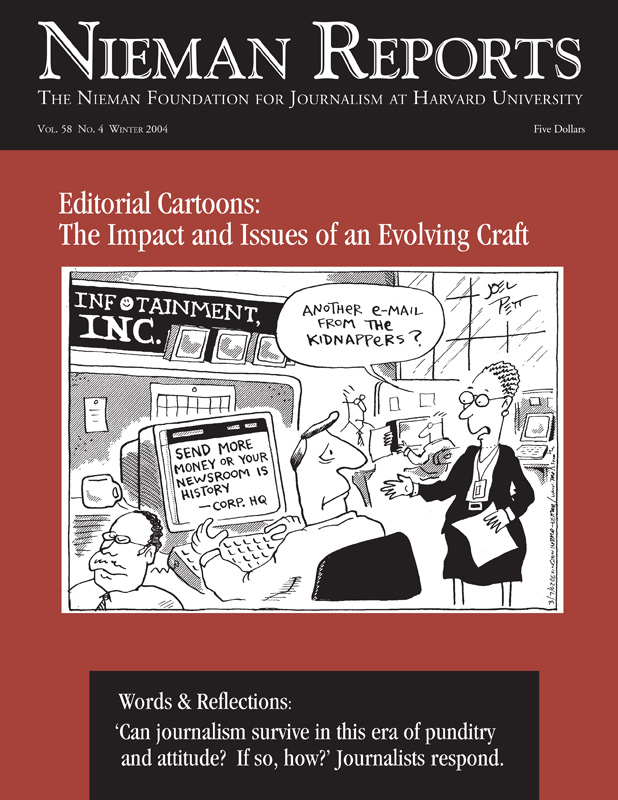There’s a whiff of nostalgia to this question, an implied belief that journalism in the past was noble and pure and that recent trends might ruin it. That bias faces us squarely in the wrong direction—backward—in thinking about what journalism and journalists can accomplish.
One might also ask how journalism could survive in an age of widespread poverty and displacement (the Great Depression) or in an age when Americans accepted the government’s word on so many things, including censorship of war reporting (World War II and the cold war). The Hutchins Commission in the late 1940’s asked how journalism could and should survive in an age of media consolidation.
The best journalists answered those challenges with memorable work that helped inform and define a nation in transition. The best journalists today do the same, not just here but also all over the globe. We need to continue defining journalism by doing it—but we also need to claim the high ground and tell people what distinguishes journalism from opinions, advocacy and pseudonews.
People want truth. Journalism thus has an audience and a calling that exist wherever people gather. The craft and the ideals aren’t in danger, but the same can’t be said for journalistic institutions or the public’s view of the news business. Look no further than your TV screen. Check “Law & Order,” the ubiquitous cop show. That’s us, the faceless mob on the courthouse steps.
As a kid I lived in a world in which most people read the newspaper and reporters were usually the good guys in movies and on television. Even the glamorized version in “All the President’s Men” gave a sense of how investigative reporting worked. A teenager paying attention today might instead watch the movie about liar and cheat Stephen Glass, hardly a call to the pursuit of truth. Blair and Kelly, not Woodward and Bernstein, are the reporters who’ve been in the news.
Turn to CNN or MSNBC and you will find Jon Stewart, the fake news guy, being interviewed by a journalist about real issues. “The media aren’t biased, they’re just lazy,” Stewart opines. Listen to talk radio, spend time in Internet forums or Web sites, and you’ll see how much hostility rages toward this undefined power called “the media.”
I’m an American, so I get to blame Washington for everything. Who hasn’t thought that some of those talking heads on Sunday morning seemed to forget years ago which seat they were supposed to occupy? I also occupy a cohost’s seat on a weekly television show called “Headline Saturday,” produced with our local CBS affiliate, so I’m not throwing rocks at journalists who appear on TV If some reporters lose their moorings on TV or radio talk appearances, after all, they don’t get in the way of others doing great work.
What’s missing in many of these public appearances, however, is a focus on the work and substance of reporting. Interviews with Anthony Shadid of The Washington Post after he won his Pulitzer Prize for reporting in Iraq helped the public understand war coverage, its dangers and its benefits.
Good journalism should speak for itself, but that only works if people are reading or listening. In the meantime, others are speaking about journalists, describing our motives and practices and largely going unchallenged.
I share some words from a recent e-mail exchange I had with a local fellow who had been invited to a forum by our marketing department and declined with a scathing e-mail describing why he and his conservative friends boycott The News & Observer. It turned out the man had rarely read our paper. Instead, he formed his opinions from local reputation among his conservative friends. In our exchange, it became clear we read many of the same publications and shared a belief in independent reporting.
“I admire your desire to pursue the truth and wish you continued success—who knows, maybe I’ll subscribe to The N&O someday,” he wrote in closing.
This exchange and others have convinced me that we can’t assume people know what makes journalism different from other kinds of information, including punditry or how reporting works. We can’t assume people know that editorial opinion is separate from news in my newspaper and many others. We can’t expect them to know that we report independently.
More and more, my newspaper aims to tell people what we’re trying to do. We’re putting more effort into delivering on those promises in small ways and big ones.
People want what journalism can deliver—reporting, facts, depth, context, independence. Looking forward, there’s plenty of that work yet to be done.
Melanie Sill, a 1994 Nieman Fellow, is executive editor of The News & Observer in Raleigh, North Carolina.


